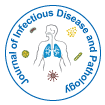Host-Pathogen Interactions: The Battle for Survival
Received Date: Oct 01, 2024 / Published Date: Oct 30, 2024
Abstract
Host-pathogen interactions are complex relationships that occur between infectious agents and their host organisms, significantly influencing disease outcomes and public health. This article explores the various types of interactions, including commensalism, mutualism, and parasitism, as well as the mechanisms employed by pathogens to invade and exploit hosts. It highlights pathogen strategies such as adhesion, immune evasion, toxin production, and intracellular survival. Conversely, hosts deploy innate and adaptive immune responses to combat infections, employing mechanisms like cytokine production and apoptosis. Understanding these interactions is crucial for developing effective prevention and treatment strategies, including vaccine development and addressing antimicrobial resistance. By elucidating the dynamics of host-pathogen relationships, researchers can enhance disease management and improve health outcomes globally.
Citation: Tianna K (2024) Host-Pathogen Interactions: The Battle for Survival. J Infect Pathol, 7: 258. Doi: 10.4172/jidp.1000258
Copyright: © 2024 Tianna K. This is an open-access article distributed under the terms of the Creative Commons Attribution License, which permits unrestricted use, distribution, and reproduction in any medium, provided the original author and source are credited.
Share This Article
Recommended Journals
Open Access Journals
Article Tools
Article Usage
- Total views: 361
- [From(publication date): 0-0 - Apr 16, 2025]
- Breakdown by view type
- HTML page views: 193
- PDF downloads: 168
